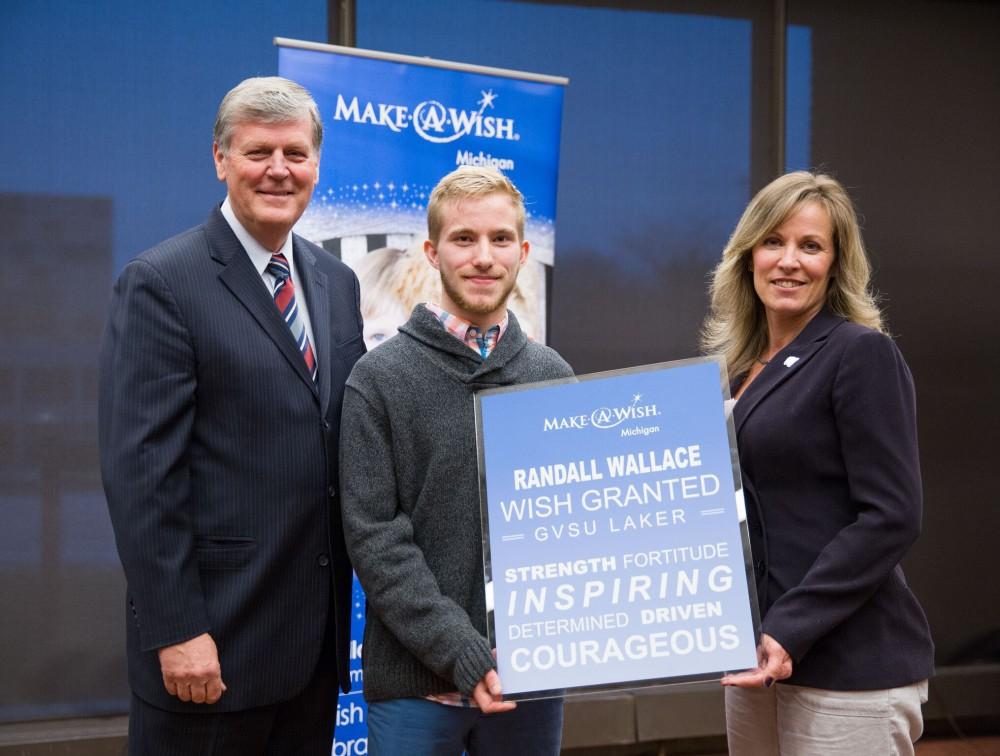Granting wishes

GVL / Courtesy – Randall Wallace President Thomas Haas, Randall Wallace, and his mother.
Feb 11, 2016
Most children involved in the Make-A-Wish foundation ask to go to Disney World or meet their favorite celebrity. Randall Wallace, however, knew that his wish could mean more than a warm vacation or a handshake.
He hoped that his wish could help him achieve his dream of becoming a cardiologist at Grand Valley State University through tuition assistance. His genies came through, and granted his wish.
Wallace, 18, was born with congenital heart disease. He knew at age 16 he wanted to become a cardiologist to help kids who have similar medical conditions.
“I feel I have a unique sense of compassion, especially toward kids with life-threatening medical conditions,” Wallace said. “I want to be a cardiologist to show kids with heart disease there is hope to follow your dreams, it just depends on how high you set them and that not just your parents are there to see you through.”
In the spring of 2015, Wallace submitted his wish request to a representative in Traverse City, Michigan, where it was then transferred to the Grand Rapids headquarters. It took almost six months for his wish to be granted.
Christy Hammond, communications and public relations manager at Make-A-Wish Michigan, explained that there were certain requirements to be met before a wish can be approved. The average time it takes for the entire process of making and approving a request is nine months.
“All that we require is that you are between (2 ½ and 18 years old), that you have a life-threatening medical condition and that you have not received a wish from another wish-granting organization,” she said. “In Randall’s case, he was referred before he turned 18 and so even though his wish is tuition assistance, he couldn’t have his wish happen until he had actually graduated high school and about to start college. Sometimes a wish can happen outside of that age range.”
Wallace’s wish for tuition assistance is a rare request to come to Make-A-Wish. Out of 413 wishes made in fiscal year 2015, only two were tuition assistance requests. Hammond said that not including Wallace’s request, there has been a total of only six tuition assistance requests from the first request in 2010 to Aug. 31 of last year.
“The average cash value of our wishes is $6,000,” Hammond said. “So when we receive a tuition assistance wish request, that is the (amount) we contribute toward college tuition.”
A big motivating factor for Wallace’s wish was so he could focus on academics and his grades more than having to work. He could never play sports, so he always enjoyed academics more than others.
“I was working 60-plus hours a week during my senior year of high school,” he said. “My hope is to use this semester to focus more on academics and focusing on learning and taking advantage of all the resources I can since I don’t have to work.”
According to the Mayo Clinic, congenital heart disease, also known as congenital heart defect, is an abnormality in the heart’s structure. Advances in science and technology have made it possible for kids who may have once died of the defect to survive to their adult years. However, the disease is terminal.
“We have a medical outreach team that works in conjunction with doctors, social workers, nurses whoever it might be that refers a child,” Hammond said. “There is very specific and thorough paperwork that has to get filled out during a process of back and forth to make sure the child qualifies and has a life threatening medical condition.”
Despite the disease, Wallace manages to keep up with his daily life.
“I’m still very physically active, I don’t ever see myself as inferior to someone that doesn’t have a medical condition,” he said. “If anything, I feel a little special in a good way.”

























